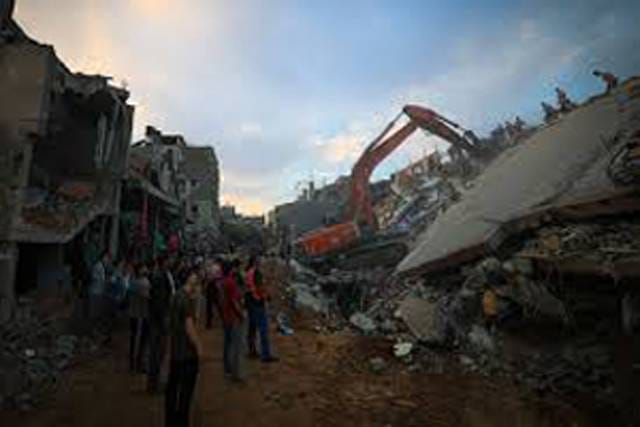31 killed in deadly Gaza strikes

Source: The Nation
Rafah - An Israeli strike in Gaza killed 31 people Sunday, the Palestinian civil defence agency said, as US National Security Advisor Jake Sullivan was visiting for talks on the brutal conflict and post-war scenarios.
Army troops have moved in on Gaza's crowded far-southern city of Rafah, which they describe as the last Hamas stronghold and where the UN says 800,000 civilians have been newly displaced by the fighting.
But Israel has also fought and bombed resurgent Hamas forces in northern and central areas of Gaza previously considered to be under army control, sparking US warnings that the military could become mired in a lengthy counterinsurgency campaign. In the latest aerial bombardment overnight, Gaza's civil defence agency said that a strike had killed 31 people and wounded 20 more in a family house in the central Nuseirat refugee camp.
The wounded included several children and rescuers were searching the rubble for missing people, said the Palestinian official news agency Wafa, while the Israeli army said it was checking the reports.
On Saturday, Palestinian relatives wailed with grief as victims including an infant were rushed to Kamal Adwan hospital in northern Beit Lahia, following Israeli strikes and heavy clashes in Jabalia.
Abu Nabil, a Jabalia resident, said "tanks and bulldozers approached our homes, forcing us to leave, after they struck a neighbouring house, injuring us.
"I call upon all free people in the world, to anyone with a shred of humanity... there are massacres happening here. Children are being torn to pieces. What's the fault of these children and women?"
Meanwhile, the stranglehold on aid reaching Gaza threatens an "apocalyptic" outcome, the UN's humanitarian chief Martin Griffiths said on Sunday as he warned of famine in the besieged territory.
"If fuel runs out, aid doesn't get to the people where they need it, that famine, which we have talked about for so long, and which is looming, will not be looming anymore. It will be present," Griffiths said.
"And I think our worry, as citizens of the international community, is that the consequence is going to be really, really hard. Hard, difficult, and apocalyptic," he told media on the sidelines of meetings with Qatari officials in Doha.
The UN said on Saturday that 800,000 people had been "forced to flee" Israel's assault on Hamas militants in Rafah.
With fuel, food and medicine running out, Griffiths said the military action in the southern Gazan city was "exactly what we feared it would be".
"And we all said that very clearly that a Rafah operation is a disaster in humanitarian terms, a disaster for the people already displaced to Rafah. This is now their fourth or fifth displacement," he said.
With key land crossings closed, some relief supplies began flowing in this week via a temporary, floating pier constructed by the United States.
Griffiths said the maritime operation was "beginning to bring in some truckloads of aid" but he cautioned "it's not a replacement for the land routes".
On Thursday, the Arab League called for a UN peacekeeping force to be deployed in the Palestinian territories and for the convening of an international conference to resolve the Palestinian issue on the basis of the two-state solution.
Griffiths said the statement from the 22-member bloc in Manama was "very important because it focused on the future".
